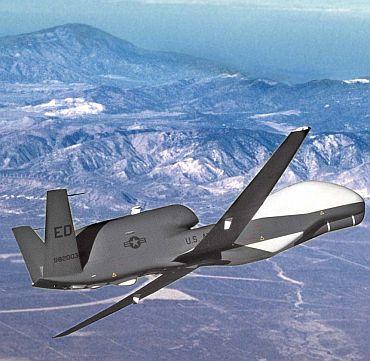 While Pakistan Prime Minister Raja Pervez Ashraf has opposed the campaign of Central Intelligence Agency-operated spy planes and has urged for alternative means to target the terrorists, a drone targeted Al Qaeda' high-ranking commander Abu-Zaid al Kuwaiti, who was killed in North Waziristan last week. Kuwaiti was killed during a drone strike while he having his breakfast.
While Pakistan Prime Minister Raja Pervez Ashraf has opposed the campaign of Central Intelligence Agency-operated spy planes and has urged for alternative means to target the terrorists, a drone targeted Al Qaeda' high-ranking commander Abu-Zaid al Kuwaiti, who was killed in North Waziristan last week. Kuwaiti was killed during a drone strike while he having his breakfast.
The target provides an excuse to the United States to continue the strikes in the lawless bordering areas of Pakistan.
The US media quoted an Al Qaeda post which read, "We celebrate to you the news of the martyrdom of the working scholar Shaykh Khalid al-Hussainan (Abu Zaid al-Kuwaiti) while eating his Suhoor (dawn time) meal, and we ask Allah to accept him in paradise."
Later local intelligence officials also confirmed the killing while saying that Kuwaiti was killed during a strike at Mubarak Shahi village (which some local tribesmen claim to the birth place of ex-Indian PM Atal Bihari Vajpayee.
"He was killed during the strike at Mubarak Shahi while he was buried at the graveyard of Tappi village", confirmed an intelligence official. Kuwaiti had replaced Al Qaeda's senior commander Abu Yahya al-Libi, who too was killed during a drone strike at North Waziristan in June this year.
After last Thursday's attack Ashraf had raised the issue of drone attacks with US Ambassador to Pakistan Richard G Olson in Islamabad.
"The PM expressed concern over the drone attacks and said that such strikes were counterproductive and an alternative means should be found to tackle the Taliban", said a spokesperson.
Despite the Ashraf's concern, the drone strikes are continue and on Sunday another strike took place at North Waziristan that according to media reports has killed another Al Qaeda leader, Mohammad Ahmed Almansoor, along with his three others companions in a village close to Miranshah, the agency headquarters.
During 2012, 38 drone strikes took place at different parts of the tribal areas and have killed 269 people so far, according to a report. On December 1, a drone strike reportedly killed Abdul Rehman Azman, a Yemeni national who was very closed to Al Qaeda's slain chief Osama Bin Ladin.
Islamabad has condemned the drone strikes at different forums but the US is not ready to stop saying these strikes are 'necessary to battle terrorists that Pakistan has been unable or unwilling to control'.
In October, cricketer-turned-politician Imran Khan, who is one of the strongest opponents of the drone strikes, took a peace rally to south Waziristan border. Khan criticised both the Pakistan government and the US for the drone strikes, and said that majority of the victims were innocent tribesmen.
He said that the government of President Asif Ali Zardari had shown no resistance to the US, pertaining to the drone attacks. "The US administration tells American people one thing and Pakistanis the other; Are these people (civilian drone victims) not humans? "Who are these 'nameless' people who are killed in the name of collateral damage", Khan had said.
Even the former US President Jimmy Carter during an interview with Russia Today has slammed American drone strikes in other countries, saying that killing civilians in such attacks would in fact nurture terrorism.
"I personally think we do more harm than good by having our drones attack some potential terrorists who have not been tried or proven that they are guilty. But in the meantime, the drone attacks also kill women and children, sometimes in weddings so this is the kind of thing we should correct", Carter reportedly said.
Talking to rediff.com senior journalist and tribal affairs expert Rahimullah Yousufzai said, "Despite Islamabad's protest the drone strikes could not be halted completely; although the number of attacks could be reduced. The US considers the drone as an effective tool to target the Al Qaeda and other militant leaderships.
He further said that when a leading Al Qaeda member is targeted, it provides 'a sort of excuse to the continuation of drone strike'. He added, "The infiltration of terrorists from this side of the border is another parameter to determine the number of strikes -- the more the infiltration, the more the drone strikes."








